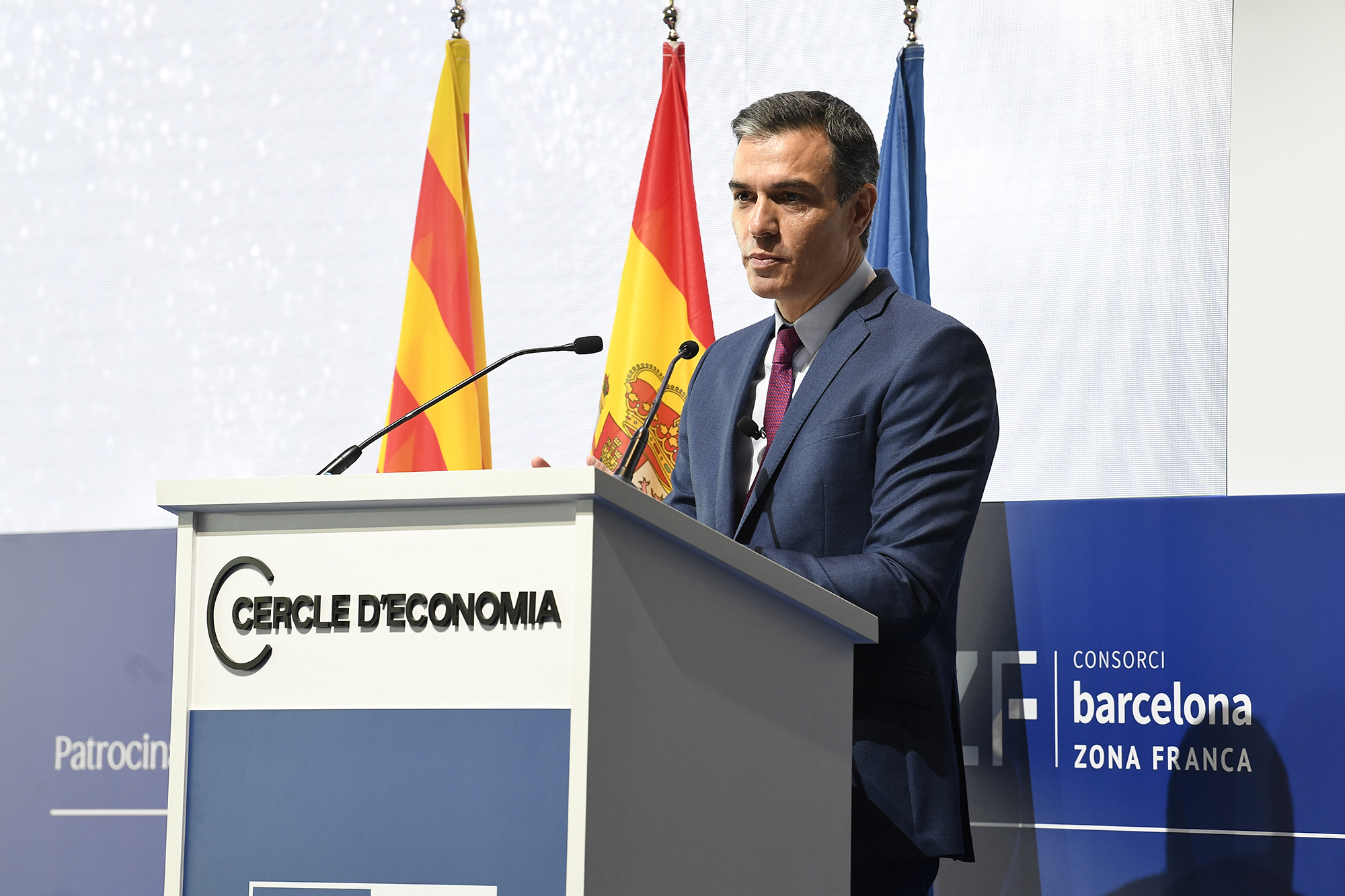Closing ceremony of the 36th annual meeting of the Cercle d'Economia in Barcelona
The President of the Government of Spain announces that masks will no longer be compulsory outdoors from 26 June
President's News - 2021.6.18
"We do it for the Spaniards, who have been disciplined all this time; for the great work of the healthcare workers and that of so many companies and professionals in the face of the pandemic, whom we thank; and we do it because we are meeting the milestones and objectives we set ourselves, step by step," said the president.
President Sánchez, accompanied by the Vice-President for Economic Affairs and Digital Transformation, Nadia Calviño, and the Minister for Territorial Policy and Public Function, Miquel Iceta, conveyed the data showing the strong economic recovery to the Cercle d'Economia, highlighting the strong job creation sustained since the peak of the third wave in January as a key sign with the growth of 1,270,000 active workers, an increase of 770,000 registered workers and 510,000 workers who have come out of ERTE.
The forecasts suggest that June will end with 189,000 more registered workers, 222,000 more than in May, a growth that is more intense for the sectors most affected by the pandemic and the restrictions: catering, but above all in accommodation services. In light of these and other indicators, Pedro Sánchez has not ruled out growth figures being revised upwards.
An appeal for reunion and concord
Before the business forum, the president addressed the need for stability and political unity to achieve common goals, appealing to the value of concord not only in the political sphere but also in the economic sphere.
"Concord is also an economic value. And discord, whether partisan or territorial, is an economic burden. And I mean discord. Because discrepancy, criticism and pluralism are positive, they enrich the debate and encourage progress," he said.
The head of the Executive called on society as a whole to come together to continue moving forwards: "This cannot be done by one government, nor by two governments. It is everyone's task, a social task. And the first step we must take is to recognise that no one - including ourselves - is in the right", he said.
Recovery Plan: a colossal drive to be the best country in Europe
 Foto: Pool Moncloa/Borja Puig de la BellacasaSánchez recalled that the Spanish economy will have the "colossal drive" of the Recovery, Transformation and Resilience Plan, "A country plan, designed with the sole purpose of making Spain - I am going to say it with ambition - the best country in Europe over the next decade", he said.
Foto: Pool Moncloa/Borja Puig de la BellacasaSánchez recalled that the Spanish economy will have the "colossal drive" of the Recovery, Transformation and Resilience Plan, "A country plan, designed with the sole purpose of making Spain - I am going to say it with ambition - the best country in Europe over the next decade", he said.
The Spanish Plan was approved by the European Commission on Wednesday, which has recognised the coherence and synergies between the Plan's investments and reforms. Moreover, the Commission considers the Plan to have the potential to increase the economy's GDP in 2024 by between 1.8% and 2.5%, excluding the positive effect of structural reforms, which could raise it substantially further and which will contribute to a "significant reduction" in income inequality.
Quoting the words of the President of the Commission, Ursula von der Leyen, on her visit to Spain on Wednesday to approve the Plan, Sánchez said that "this is a plan that will profoundly transform the Spanish economy, making it greener, more digital and more resilient".
Sánchez explained the challenges facing the country in the coming years in order to achieve success and maximum development to the economic forum, which he divided into, firstly, the need for a roadmap and tools for action, materialised in the Recovery Plan; secondly, resources, which will be provided by the Plan's funds; thirdly, business talent to create opportunities and take advantage of them; fourthly, qualified workers, an area in which the reform of vocational training initiated by the government will be key; and lastly, political stability.
Finally, the president stressed the importance of working for young people, pointing out that "they must be at the centre of our public policy". In this respect, he highlighted the recent announcement of the launch of a major youth unemployment plan to improve employability and provide opportunities for one million young people over the next three years. Similarly, the future Trainee Statute will address the adaptation of internship contracts into real training instruments that will be the path towards stable employment, while the Housing Plan will seek to respond to another of their major problems, access to housing, by creating a real stock of public rental housing aimed primarily at our young people.
"A country is what its young people dream it will be. And for many years, young people in Spain have been marginalised and even forced to leave. They will be the measure of our success," concluded the president.
Non official translation




